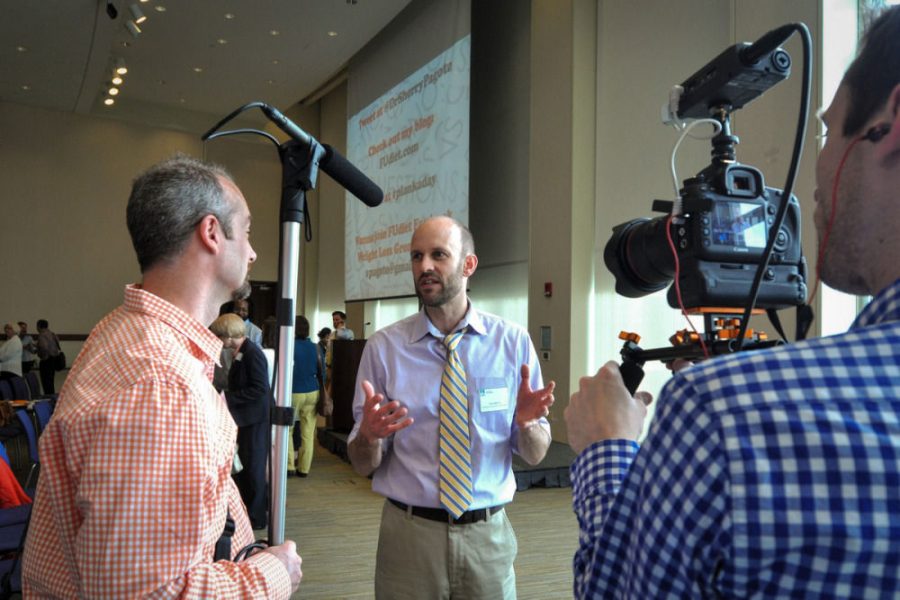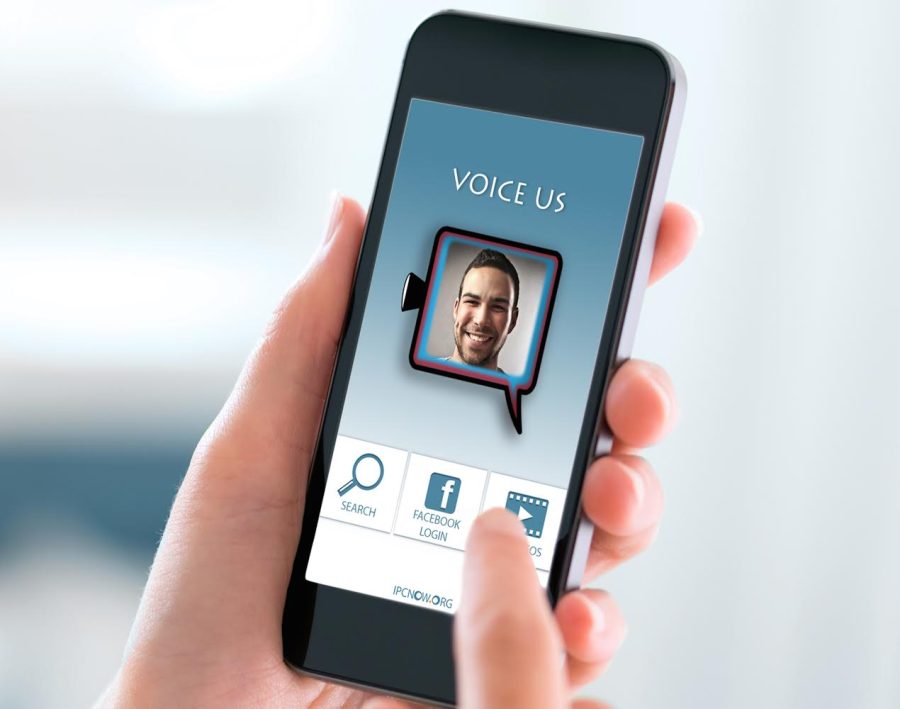In honor of the University’s 50th anniversary The Mass Media is contacting 50 former student leaders and profiling them throughout the year. This is the first in a series.
Neil MacInnes Barker squatted with his smartphone outstretched, flipping through a list of Massachusetts state legislators. His new app, Voice US, makes contacting legislators in government easy.
“I try to teach people about this great gift that they have,” Barker said. “The most valuable, sacred, honorable thing that you have is to vote, but also to be engaged. You have a tremendous amount of power, far more power than corporations with a lot of money (…) people don’t understand their value.”
The goal of the app is to make it easier for people to engage in democracy. Open it up, type in your district, and you see all of your legislators. Click on one, and you have three options. You can email, call or send your politician a video. The video option is the real innovation.
“Your story is important. It’s valuable. People will listen to you,” Barker said. “You don’t have to dress up fancy. You don’t have to speak fancy. You’re yourself, and that’s the best way to communicate because it’s human to human.”
The app catalogues the videos by topic, so people can find others with similar concerns to form advocacy groups. It will be available for free in the Apple Store on Oct. 4, 2014. Search for “Voice US” or visit ipcnow.org. Barker spends a lot of time at the state house talking with legislators about his own interests, and he wants others to do the same. Virtually, at least.
“They want to hear from their constituents,” Barker said. “They get this glisten in their eye when I talk about this app. They’re like, ‘I’m up there fighting for stuff that I’m assuming my constituents want, and I’m also getting a lot of people talking in my ear who do have time, lawyers, lobbyists, and it’s not that fulfilling. I’d listen to a kid from my district first.’”
Behind Barker, in the corner of his home-office, a duel-screened computer littered with open windows, shows a video timeline for a new film: At War With Peace. It will be Barker’s second. His first is called is called No Place Like Home, and it’s a documentary about youth homelessness in Boston.
Barker’s idealism “awakened,” he said, when he was a student at UMass Boston, and President of the Undergraduate Student Government. He graduated in 2011.
“I wouldn’t have been doing everything I am doing now with my company, IPCNOW without UMass Boston,” he said. And the interview began…
Why did you decide go to UMB?
I was moving back to Massachusetts from New Hampshire. I wanted to be in the city at a state school and I grew up loving the ocean. That’s basically it.
What do you remember about your experience?
It was challenging to go back to school late in life, but I found that in that environment I felt confident to get involved. I felt supported by the administration at UMass. There was a very personal student approach. I felt valued as a student there.
Were you involved in any clubs or student activities?
I don’t know how many non-traditional students get so involved, but I was Student Body President. I feel, as a non-traditional student, being between the age of traditional students and faculty and staff, I could be a goof-ball with 18/19 year-olds and then I could go sit with executive staff who were not that much older than me, and bridge the connection. I was also vice-chairman of the Student Advisory Council for the state. I was a member of the Veterans Center, MASSPIRG, and so many boards and committees. It was a tremendously rich experience.
What was your favorite class, or activity that you did on campus?
Favorite activity: Doing Campus Connect as a Student Senator, organizing over two weeks, gathering information from the faculty, staff and students, and then implementing that in real time with policy. That informed my belief with how government works, that you’re supposed to hear directly from the people that you’re representing, and you’re supposed to carry out the actions that they want to the best of your ability.
Favorite class: All of my EEOS classes. I could spend many more hours being immersed in the benthos of the ocean and the minerals of the earth. Any class that delivered the chance to ride in a boat or wade around in water had to be the best. I liked playing piano and my ASL classes a lot too.
Do you remember any of your professors or fellow students?
One of my favorites was Juanita Urban-Rich, who was my Oceanography professor, just a really stellar professor, really hands-on, which worked well for me. Alan Gonz, Anamarija Frankic, Emmet Schafer, Tim Sieber from Anthropology. His classes were really great. And then all of the people in the Undergraduate Student Government, Chancellors, the student life staff and leaders, Mass Media folks, center coordinators and club presidents and members, the executive administration of all the UMB departments from the chancellor down, Shelby. I also enjoyed the staff: cafeteria workers, campus police, athletic coaches, I mean I knew everybody. It sounds corny and contrived, but it does feel like a family. There’s a lot about UMass Boston that I think is really valuable. I really enjoyed my experience there.
What are the most important things you learned at UMB?
Part of it was that experience of being so involved, I learned the value of community, how to listen, negotiate, collaborate. Aside from all of the stuff I learned in classes the biggest things were from all of the leadership experience that I had. Those extracurricular activities lead me to be reawakened, to do what I do now. The understanding of what people can do together on a large level all came from what I did as the Student President.
What’s one thing that you did at UMass that you couldn’t have done somewhere else?
I keep saying awakening. I feel like a born again Christian. I’m a born again advocate. Chancellor Motley came around the corner and he slapped me on the forehead and I saw the light. It awakened my commitment to public service.
Because it’s a state school, there is a reliance on the state government and a connection to stay involved in the government. That brought me to where I am today in how I am involved at the state level. One of the things about UMass Boston that’s different from all of the other campuses, it’s very involved in the community and very involved at the political level. I think that is something I wouldn’t have got from somewhere else. Then, having the opportunity to step out of meetings or classes and go look at the water to me is very valuable. I love looking at the water.
Where did you spend most of your time on campus?
On the second floor of the Campus Center, in my office, that’s where I spent the majority of my time. I went to the swimming pool whenever I could, and the Library, and the Quinn building, I liked to have breakfast in the Quinn.
Do you have any wishes for UMass Boston on its 50th birthday?
I feel that UMass has been good with raising up the community around them, and being a part of the community, and it’s right in an urban environment where there are a lot of people who are financially struggling. So I would wish for the university that it continues to work toward that goal of being an internationally renowned quality institution, but not leave behind the people in the community who cannot afford to go there, or who struggle to go there. So, happy birthday UMass Boston. Good luck where you’re going. Don’t forget where you’ve come from.
UMass Boston 50 at 50: Neil MacInnes-Barker
By Caleb Nelson
|
September 14, 2014
Voice App
About the Writer
Caleb Nelson served as the following positions for The Mass Media the following years:
Editor-in-Chief: Fall 2010; 2010-2011; Fall 2011
News Editor: Spring 2009; 2009-2010


